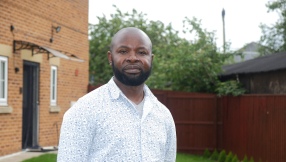
The Coalition for Marriage has accused the Government of sidelining parents over what their children learn about marriage and relationships in school.
Education secretary Damian Hinds said today that new mandatory relationship and sex education (RSE) classes coming to schools in 2020 would equip children for life in the 'complex' modern world and teach them how to stay safe online.
'Growing up and adolescence are hard enough, but the internet and social media add new pressures that just weren't there even one generation ago,' he said.
'So many things about the way people interact have changed, and this new world, seamless between online and offline, can be difficult to navigate.
'Almost twenty years on from the last time guidance on sex education was updated, there is a lot to catch up on.'
But changes to the way RSE is taught are being challenged because they include new restrictions on when and how children can be opt outed out by their parents.
Although parents are free to withdraw their children from sex education lessons at the primary school level, certain conditions come into effect for secondary school students.
Head teachers of secondary schools can accept a request from parents to withdraw their children from RSE up to the age of 15 'unless there are exceptional circumstances', after which time students can choose to opt in.
However, there is no right to withdraw children at primary or secondary school age from relationship education lessons, which will cover gay and transgender issues.
Colin Hart, chairman of the Coalition for Marriage, said the lessons were 'not age-appropriate'.
'No one objects to the Government trying to make children safer online by teaching them about internet trolls and about the dangers of social media, however, the plan to downgrade marriage – and sideline parents whilst doing it – is completely unacceptable,' he said.
'The Department for Education is sidelining traditional marriage, the most stable form of relationship for raising children and forcing them to learn about every other form of relationship under the sun, even when it is not age-appropriate. The law should encourage traditional marriage, not undermine it.'
Parliament debated the changes on Monday after over 100,000 people signed a petition demanding that the Government protect the 'fundamental right' of parents to withdraw their children from RSE.
During the debate, Mr Hinds defended the plans, saying that they were balanced and still protected the right of faith schools to teach their values.
'There is a parental right to request the withdrawal of their child from sex education, but we have carefully balanced that with the right of the child as they get older and become competent to make their own decisions. I think that we have struck the right balance there,' he said.
'More broadly, we encourage schools to work with parents, and there is an obligation to consult parents on the content of these subjects and to publish that consultation on the internet,' he said, adding that it was 'correct to say that in the guidance we set out that the core content must be covered, but beyond that faith-based schools can reflect the teachings and traditions of their faith to help to build on that'.
The new guidance is being rolled out despite weeks of protests at Parkfield Community School in Birmingham by Muslim and Christian parents angry over lessons teaching about gay relationships.
The lessons were defended by head of Ofsted Amanda Spielman.
Mr Hart continued: 'Unfortunately the Department for Education and Ofsted seem to believe that traditional marriage no longer matters.
'Their favoured curricula deliberately marginalises those who do not support political correctness for religious reasons, like the Muslim mothers in Birmingham.
'But even those keen to promote other forms of family life have been unable to deny that evidence shows that children do best when they are raised by their mother and father.
'It also ignores that marriage, the life long union between one man and one woman, despite all the rhetoric and spin is the most stable form of relationship. This is why rather than downgrading marriage we should doing more to celebrate its many societal and personal benefits.'

The Coalition for Marriage has accused the Government of sidelining parents over what their children learn about marriage and relationships in school.
Education secretary Damian Hinds said today that new mandatory relationship and sex education (RSE) classes coming to schools in 2020 would equip children for life in the 'complex' modern world and teach them how to stay safe online.
'Growing up and adolescence are hard enough, but the internet and social media add new pressures that just weren't there even one generation ago,' he said.
'So many things about the way people interact have changed, and this new world, seamless between online and offline, can be difficult to navigate.
'Almost twenty years on from the last time guidance on sex education was updated, there is a lot to catch up on.'
But changes to the way RSE is taught are being challenged because they include new restrictions on when and how children can be opt outed out by their parents.
Although parents are free to withdraw their children from sex education lessons at the primary school level, certain conditions come into effect for secondary school students.
Head teachers of secondary schools can accept a request from parents to withdraw their children from RSE up to the age of 15 'unless there are exceptional circumstances', after which age students can choose to opt in.
However, there is no right to withdraw children at primary or secondary school age from relationship education lessons, which will cover gay and transgender issues.
Colin Hart, chairman of the Coalition for Marriage said the lessons were 'not age-appropriate'.
'No one objects to the Government trying to make children safer online by teaching them about internet trolls and about the dangers of social media, however, the plan to downgrade marriage – and sideline parents whilst doing it – is completely unacceptable,' he said.
'The Department for Education is sidelining traditional marriage, the most stable form of relationship for raising children and forcing them to learn about every other form of relationship under the sun, even when it is not age-appropriate. The law should encourage traditional marriage, not undermine it.'
Parliament debated the changes on Monday after over 100,000 people signed a petition demanding that the Government protect the 'fundamental right' of parents to withdraw their children from RSE.
During the debate, Mr Hinds defended the plans, saying that the Government they were balanced and still protected the right of faith schools to teach their values.
'There is a parental right to request the withdrawal of their child from sex education, but we have carefully balanced that with the right of the child as they get older and become competent to make their own decisions. I think that we have struck the right balance there,' he said.
'More broadly, we encourage schools to work with parents, and there is an obligation to consult parents on the content of these subjects and to publish that consultation on the internet,' he said, adding that it was 'correct to say that in the guidance we set out that the core content must be covered, but beyond that faith-based schools can reflect the teachings and traditions of their faith to help to build on that'.
The new guidance is being rolled out despite weeks of protests at Parkfield Community School in Birmingham by Muslim and Christian parents angry over lessons teaching about gay relationships.
The lessons were defended by head of Ofsted Amanda Spielman.
Mr Hart continued: 'Unfortunately the Department for Education and Ofsted seem to believe that traditional marriage no longer matters.
'Their favoured curricula deliberately marginalises those who do not support political correctness for religious reasons, like the Muslim mothers in Birmingham.
'But even those keen to promote other forms of family life have been unable to deny that evidence shows that children do best when they are raised by their mother and father.
'It also ignores that marriage, the life long union between one man and one woman, despite all the rhetoric and spin is the most stable form of relationship. This is why rather than downgrading marriage we should doing more to celebrate its many societal and personal benefits.'













